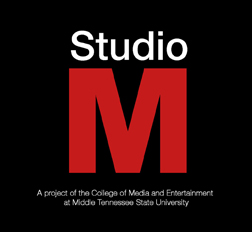To prepare its students for successful careers in an ever-changing media landscape, MTSU’s College of Media and Entertainment is launching a “teaching hospital” approach to journalism this month that focuses on mobile storytelling about issues facing millennials.
“Studio M” was jump-started by a $50,000 grant from the John S. and James L. Knight Foundation to support talent and leadership, and advance excellence in journalism.
Other founding contributions included $25,000 from BlueCross BlueShield of Tennessee and $10,000 from The Tennessean.

Val Hoeppner

Ken Paulson
 Studio M — which stands for media, mobile, millennials and MTSU — will allow students to be immersed in tracking millennials and issues that affect them, especially in the lead up to the 2016 election.
Studio M — which stands for media, mobile, millennials and MTSU — will allow students to be immersed in tracking millennials and issues that affect them, especially in the lead up to the 2016 election.
Issues such as employment, health care, the economy, education, student loan debt, gender pay gap, religion, race and diversity will be reported, recorded, produced and written in partnership with The Tennessean and other news organizations.
“This is about young journalists reporting about their own generation through multiple media and on multiple platforms,” said Ken Paulson, dean of the College of Media and Entertainment at MTSU. “Studio M gives our students invaluable experience and will allow us to tell insightful stories about millennials and their growing impact on society.”
“The media lab will use a unique approach in preparing the next generation of journalists to meet changing community information demands,” said Shazna Nessa, Knight Foundation director for journalism.
“It will combine issues important to millennials with a growing focus on mobile technology, making students their own test subjects for audience engagement, while encouraging them to experiment and innovate.”

MTSU students work on deadline inside the Center for Innovation in Media in this file photo from the university’s College of Media and Entertainment. (MTSU file photo courtesy of the Center for Innovation in Media.)
This new teaching approach will primarily target mobile news platforms and will launch in conjunction with MT Now, an app developed by MTSU’s Center for Innovation in Media.
The goal is to provide the best possible mobile experience for users of Studio M and media partner apps. That’s important since social media platforms such as Facebook, Instagram, Twitter and SnapChat have become the default mobile experience for millennials, who are more accustomed to “bumping into news” on mobile devices, said Val Hoeppner, project leader and director of the Center for Innovation in Media.
The center houses the university’s student-run media entities under one roof inside the Bragg Media and Entertainment Building.
“The heart and soul of the project will be in classrooms where a low-cost teaching hospital method will train students to tell complex stories for a mobile and millennial audience,” Hoeppner said. “Studio M students will use a combination of data and old-fashioned reporting to create comprehensive stories that look at millennials across the state and across the nation.”
In the first year of operation, Studio M will reach nearly 130 School of Journalism students through courses such as Advanced Reporting, Immersion Media, Feature Writing, Reporting and Data Journalism. Students will work under the direction of professional journalists and professors of practice, those who continue to practice their craft in addition to teaching courses.
Studio M faculty include:
- Hoeppner, who will direct the creation of multimedia content including video, interactive timelines, photography, podcasts and social media distribution and engagement. Hoeppner is a nationally known expert in mobile news strategy and storytelling.

Dr. Ken Blake

Whitney Matheson
- Whitney Matheson, a former USA Today writer with experience in podcasting, pop culture, blogging, social media and digital media. Matheson will direct the project’s writing, paving the way for students to find national sources, experts and data.
- Dr. Ken Blake, who heads the MTSU Poll and teaches data journalism courses. Blake will lead the data analysis efforts of Studio M and also break down millennial data within the MTSU Poll for use by Studio M and its media partners.
- Leon Alligood, a professional journalist and associate professor in the College of Media and Entertainment. Alligood teaches long-form writing and will work with students in his immersion and interactive media courses.
- Pat Embry, a professional journalist and the Seigenthaler Chair in the College of Media and Entertainment. Embry, who also runs the Seigenthaler News Service at MTSU, will act as writing coach and editor.
To help explain millennial issues on platforms millennials prefer, Studio M will hire a coding coach to help students organize and visualize data, create APIs — or application programming interfaces — for building apps to take advantage of a mobile audience, and help maintain mobile and digital distribution channels.

Pat Embry

Leon Alligood
 The Center for Innovation in Media in the MTSU College of Media and Entertainment combines the newsrooms for Sidelines, the student newspaper; WMTS-FM, the student-run radio station; Match Records, the student-run record label; MT10, the student-operated cable television station; and WMOT-FM, the 100,000-watt public radio station, in a single location.
The Center for Innovation in Media in the MTSU College of Media and Entertainment combines the newsrooms for Sidelines, the student newspaper; WMTS-FM, the student-run radio station; Match Records, the student-run record label; MT10, the student-operated cable television station; and WMOT-FM, the 100,000-watt public radio station, in a single location.
Learn more at www.mtsu.edu/innovationinmedia.
The Knight Foundation supports transformational ideas that promote quality journalism, advance media innovation, engage communities and foster the arts. For more information, visit knightfoundation.org.


COMMENTS ARE OFF THIS POST